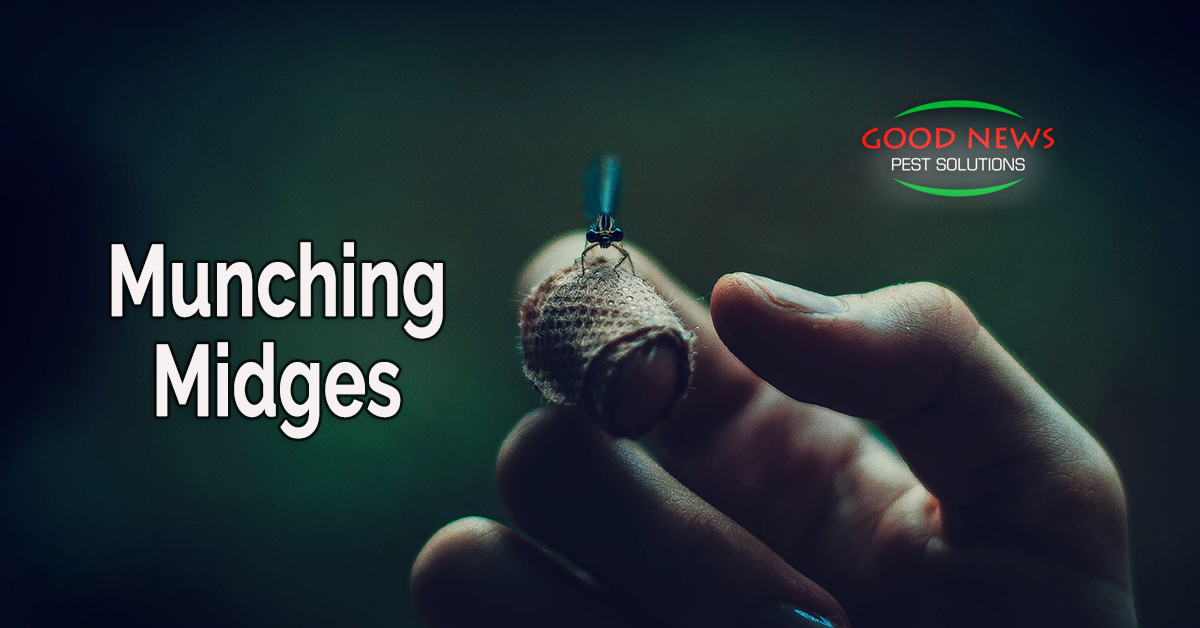
Munching Midges
Thanks to our wonderful sub-tropical weather and the constant influx of new people – snowbirds, retirees and assorted new residents – we have no shortage of biting insects to contend with.
Our most “popular,” of course, is the mosquito. It’s followed closely behind by the ankle biters we often refer to as no-see-ums, because they’re so small, or sand fleas. Their proper name is Ceratopogonidae or biting midges.
No, not a hangry Marvelous Mrs. Maisel in need of a Snickers bar. These tiny, biting flies make up just a few of the more than 47 species of midges found in the Sunshine State. Like mosquitoes, it is the pregnant female that does the biting.
In the Spotlight
They’re sometimes hard to see with the naked eye since even the largest midges are less than 1/8 inch long. They range in color from yellowish brown to grey and even black. Their bite leaves a raised red mark on your skin, similar to a spider or mosquito bite. It’s actually caused by an allergic reaction to the bite.
The best way to see midges – no pun intended – is when the males are swarming. They will circle around buzzing at you, maybe even being a little annoying, but they will not bite you.
Thankfully, while some biting midges spread diseases like bluetongue virus to livestock, horses, and some deer, the species we see here in the United States do not transmit diseases to humans. At least for now. Nature and viruses have ways of adapting, as we all know, and there are some dangerous to human species in Central and South America and Africa.
A Day in the Life
All midges, biting or otherwise, have a life-cycle similar to that of mosquitoes. After being laid in standing water (or sometimes damp soil), eggs hatch and the larvae grow in debris at the bottom of the standing water.
Next is the pupa stage. They begin forming wings and legs, moving toward the surface. Depending on the weather, the larval stage can last up to a year. Midge larvae play an important role in the ecosystem by helping to break down leaves and other organic material on the bottom of these watery areas.
Once the pupas emerge onto the surface of the water, they will swarm around looking for mates and laying more eggs for the next two to three weeks.
While females can travel up to a mile looking for a blood source, midges tend to stay close to their breeding grounds. The males tend to do their swarming in the early hours of the morning or last light of the evening.
It Bit Me!
As mentioned earlier, your body’s reaction to midge bites is allergy-oriented. As such, there is a slight possibility of a severe reaction sending someone to the hospital with anaphylactic shock. Folks who live in areas with a high population of midges can even develop an immunity to the bites over time.
Until you get to that point, though, know that midge bites can last from a few days to two weeks, causing discomfort, itching, and skin irritation.
To treat midge bites, soak a washcloth in warm water, add a mild soap and gently wash the skin. Using cold water or an antihistamine medication like Benadryl will help with the itching. Scratching the bite area can lead to infection.
The easiest way to prevent midge populations from lingering is the same as mosquitoes – and a challenge during the rainy season. But dumping out any standing water, like pet bowls, bird baths and clearing puddles will help limit the spread of biting midges.
If you need to deal with any other insect pests in your home or yard, we are here to help! Our most popular solution, Go Green Perimeter Plus treats for the most prevalent bugs we see here on the Gulf Coast of Florida – roaches, flies, ants, silverfish, spiders and more. For the full run down – and more details on how it’s safe for your family, please give us a call!
« Back to BlogProudly Serving
Sun City Center, Ruskin, Palmetto, Parrish, Ellenton, Bradenton, Anna Maria, Holmes Beach, Bradenton Beach, Longboat Key, Lakewood Ranch, University Park, Myakka City, Sarasota, Siesta Key, Osprey, Nokomis, Casey Key, Venice, Englewood, North Port, Port Charlotte, Punta Gorda, Arcadia
Things You Can Do
Pay Your Bill Online
Leave Us a Review
Request a Free* Termite Inspection
Stop Mosquito Bites
Get Rid of Rodents
Get a Termite Damage Warranty
Get Pest Control for Your Attic
Get Pest Control for Your Business Request Prayer
Corporate Address
1080 Enterprise Court, Ste A
North Venice, FL 34275
Call Now: (941) 412-9610
Text: (941) 412-9610
Fax: (941) 412-0080
